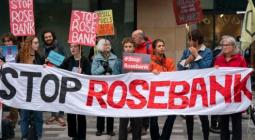Germany uses funding to pressure climate groups on Israel-Gaza war
Many Global South climate groups are funded by the German government, a political ally of Israel, and feel unable to criticise Israel’s military action in Gaza
The German government has used its financial power over climate activists in the Global South to try to stop them publicly criticising Israel’s attacks on Gaza in recent months, according to sources interviewed by Climate Home.
Many climate and development organisations based in developing countries rely directly or indirectly for funding on the German government, which is among Israel’s strongest political supporters.
Three sources Climate Home spoke to said that, after criticising Israel’s actions for humanitarian reasons, they were either pressured by their German-funded employers to resign, had contracts put on hold, or were warned they would lose funding if they made further comments on the issue.
Tensions between German and international climate campaigners were evident at December’s Cop28 climate summit in Dubai, with several German campaign groups distancing themselves from criticism of Israel by Climate Action Network International. One accused the civil-society umbrella group of antisemitism.
Funding threat
Twelve climate activists – all of whom asked to remain anonymous because of the sensitive nature of the subject – told Climate Home many climate organisations fear that speaking out about Israel’s military actions in Gaza will cost them German funding.
The German development ministry BMZ says on its website that it checks whether organisations it funds have been involved in “statements or actions” that “make it undesirable to provide support to that organisation”.
As examples, it lists incitement to hatred and violence, denial of Israel’s right to exist, antisemitism and support for the global movement for boycott, divestment and sanctions (BDS) against Israel. It urges partner organisations to “sanction” staff who “violate these principles”.
A spokesperson for the German state development organisation GIZ told Climate Home the organisations it funds are “bound to comply” with its principles on non-discrimination.
The spokesperson added that, in line with the German government and parliament, GIZ uses the International Holocaust Remembrance Alliance (IHRA) definition of antisemitism.
The IHRA provides examples of what it considers antisemitic, which include arguing that the state of Israel is a racist endeavour or comparing Israeli policy to the Nazis.
One consultant to climate campaign groups told Climate Home they had an individual contract with a German foundation postponed after accusing Israel of genocide on social media. “It was going to be my main source of income,” they said, “I’m financially screwed.”
An activist from the Global South said their organisation’s German funder had told them not to criticise Israel. To keep the money, the organisation heeded this warning but “the relationship with the funder has become extremely tense”, the activist added.
“I completely get feeling guilt as Germans for an atrocity that occurred, but that should not trickle down into activist organisations and NGOs and civil society organisations trying to make a change on the ground,” they said.
Difficult position
Another activist from the Global South told Climate Home the German-funded climate and feminist campaign group they work for had issued guidelines advising staff on how to talk about the Israel-Gaza conflict.
The activist resigned after declining to follow the guidelines. “I’m not going to allow anyone to censor me,” they told Climate Home, adding they were now unemployed and their mental health had suffered.
Another foreign employee of a German climate campaign group told Climate Home their bosses were “pretty pro-Israel”, while many of the organisation’s staff were not.
But even the group’s leadership is in a “very difficult position”, they said, because the German government funds the organisation and has discussed removing funding from groups that support the Palestinian cause or work with others that do.
Cancellations
Climate scientist Julia Steinberger, who specialises in ecological economics and is the daughter of a Holocaust survivor, told Climate Home she was uninvited from an event in Austria after she said she would speak about Israel’s “genocide”.
Another climate scientist, based in Germany, told Climate Home they had been warned by colleagues that support for Palestine would “cancel” them in Germany.
It is not just climate activists who are running into problems over expressing their opinions on the Israel-Gaza conflict. In December, the chair of an Egyptian women’s rights charity told Egyptian news website Mada Masr that the German government had cut funding after she signed an open letter calling for an end to the war and support for the global boycott movement against Israel.
Asked about the case, the German embassy cited the government’s funding criteria that recipient organisations cannot call for boycotts against Israel. In 2019, the German parliament – with support from the Green Party – passed a non-binding motion calling for German funding to be cut to groups that support such boycotts.
Another NGO, the Egyptian Initiative for Personal Rights, ended its cooperation with the German government over the defunding of the feminist group and organised a petition, signed by nearly 1,000 people, calling for a boycott of the German-Egyptian cultural week.
Greta’s German critics
In Germany, support for Israel is more widespread than in most of the rest of Europe and goes beyond the far right to include liberals and leftists, who comprise much of the climate movement.
This has led to conflict between German climate groups and their international counterparts, both online and in person at Cop28 in Dubai.
As a result, several German climate organisations have split from, or threatened to quit international networks like Fridays for Future and Climate Action Network International.
On October 20 – two weeks after Hamas militants killed about 1,140 Israeli and foreign civilians and took more than 240 hostages, and with Israel’s military response ramping up – Swedish climate activist Greta Thunberg posted on X “in solidarity with Palestine and Gaza”.
She had previously posted similar messages “in solidarity with Ukrainians”, but this one proved more controversial, not just with the Israeli government and her traditional critics on the far-right but with the German branch of Fridays for Future (FFF), the student-led climate movement Thunberg inspired.
Two days later, FFF Germany’s most high-profile activist Luisa Neubauer spoke at a rally in Berlin on a podium showing the message “against terror and antisemitism, solidarity with Israel”.
In a statement, she sought to strike a balance, saying that FFF Germany had “unlimited solidarity” with the Jewish people as well as being concerned about anti-Muslim racism and civilians in Gaza.
Dubai divisions
In late November, the international climate movement gathered in person at Cop28 in Dubai. The Israeli army had by then invaded the Gaza Strip, killing 17,000 people, bombing a refugee camp and an ambulance convoy, and raiding a hospital.
Many climate activists felt those were actions they could not ignore. In solidarity, many wore keffiyehs and lanyards in the colours of the Palestinian flag, given out by the Palestinian pavilion at Cop28.
At their big climate march in the venue, activists carried banners saying “ceasefire now, end occupation”, and chanting “no climate justice without human rights”.
The next day, the umbrella group Climate Action Network (CAN) International gave its “Fossil of the Day” award to Israel, accusing the Israeli government of genocide and colonialism. That decision went down badly with CAN International’s German members.
The acting CEO of the Oeko-Institut, Anke Herold – which gets much of its funding from the German government – said that CAN used “antisemitic phrases” in its presentation of the award.
She told Climate Home: “The two antisemitic phrases in the statement are the references to ‘Israeli colonialism’ and the reference to ‘the intent of genocide’.” She declined to comment further on why she considers those phrases antisemitic.
At Cop28, she added that the institute would consider terminating its CAN membership if “universal values such as solidarity with all those affected, human rights for all and international humanitarian law” were not upheld.
Christoph Bals, policy director of environmental advocacy group Germanwatch, told the Deutsche Press Association: “Despite Israel’s very problematic actions in the Gaza Strip, we neither adopt nor support the justification for the Fossil of the Day to Israel.”
He said Germanwatch had voted against the decision, “and – when it was actually carried out – communicated our red lines for the reasons. Unfortunately, this input was not taken into account this time.”
As a result, Germanwatch stopped going to the CAN political coordination group, a daily meeting of around 50 people during Cop28 to discuss strategy. Germanwatch got €2.7m ($2.9m) from the German government in 2022 – about €1m of which was from BMZ.
The German branches of Greenpeace and Oxfam also distanced themselves from Israel’s Fossil of the Day award.
Humanitarian crisis
Five months after Hamas’ attack on Israeli citizens, Israel’s military action in the Gaza Strip continues, amid growing international calls for a ceasefire.
The United Nation says about a quarter of Gaza’s population is on the brink of starvation, after attacks on aid convoys, and infectious diseases are spreading fast with little access to medical care.
With Germany’s position on the conflict unchanged, British climate justice activist Asad Rehman said many in the climate movement are questioning their partnerships with the German government and German climate campaign groups.
“How can we ally and work together with German organisations that are not prepared to stand up against their own government?” he asked.
Cover photo: Protesters at Cop28 in Dubai (Photos: Cop28/Christopher Pike)





